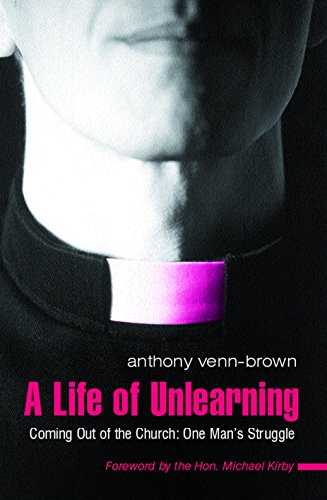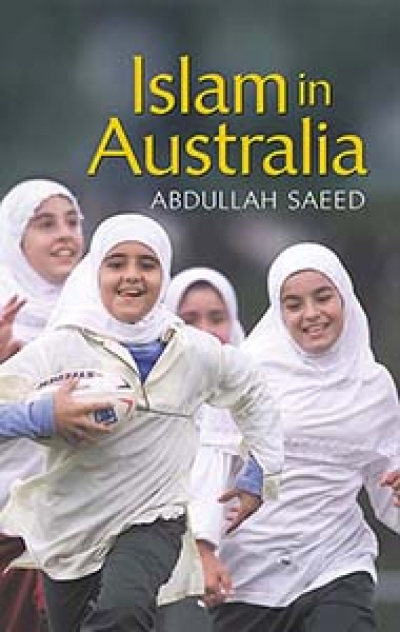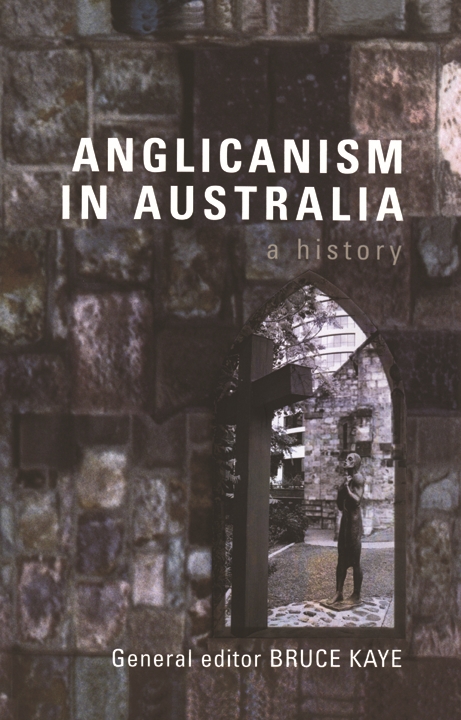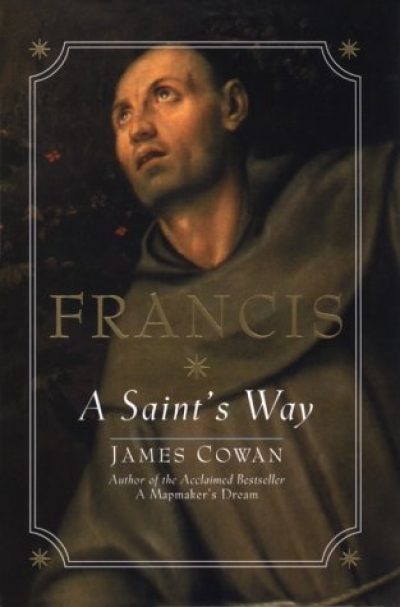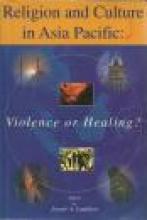Religion
A Life of Unlearning: Coming out of the church: One man's struggle by Anthony Venn-Brown
In the era of gay liberation, ‘coming out’ has for many taken on the character of a religious experience. Gays and lesbians in the US draw easily on a religious culture of personal salvation even while denying the sometimes oppressive institutions it has created. In Australia, we are not given to the same public display of emotional and spiritual commitment, but ‘coming out’ has nevertheless come to be regarded as a gay rite of passage.
... (read more)Reflections in Glass: Trends and tensions in the contemporary Anglican church by Peter Carnley
The Anglican Church worldwide is currently facing the gravest threat ever to its international unity. Where the vitriolic debates over the ordination of women failed to shatter the Anglican Communion, the ordination of an openly gay bishop in the US in late 2003 may well succeed. Conservative bishops have demanded that the American Episcopal (Anglican) Church’s leaders be disciplined. If the Archbishop of Canterbury does not oblige once an international report has been tabled later this year, the break-up of the Anglican Communion is highly probable.
... (read more)Iran’s Islamic revolution in 1979, the disintegration and demise of the Soviet Empire a decade later, and the attacks in New York and Washington in 2001 have all heightened interest in ‘understanding’ Islam in the West. The Iranian Revolution was very much a revolution of the ‘countryside’ against the glitter, domination and corrupt politics of the ‘metropolis’. Its success created an enormous interest in Islam. For the West, the demise of the USSR was more than the demise of what Ronald Reagan had dubbed an ‘Evil Empire’; it removed the ‘enemy’ whose containment had dominated the politics of the Cold War in the US and its European allies. Its historical significance was described by the American political scientist Francis Fukayama in his influential essay ‘The End of History’. The search was on for the enemies of international capitalism and liberal democracy. A few years later, in an equally influential and widely read work, The Clash of Civilizations (1993), Harvard political scientist Samuel Huntington identified Islam as one of the potential enemies of Western civilisation.
... (read more)With the growing politics of fear focused on Islam, and the pervasive ‘Othering’ of Muslims both nationally and internationally, this book on the everyday lives, beliefs, and practices of Australian Muslims is an important social antidote. Abdullah Saeed, a leading Australian Muslim scholar of Islam, provides us with a readily accessible book that introduces the basics about the religion of Islam, and a short social and cultural history of Muslims in Australia. It explores Islamic religious organisations and leadership in Australia, the diversity of Muslim communities, common stereotypes and misunderstandings about Islam as well as the difficulties and discrimination Muslims have experienced in Australia. This is a clear, concise, culturally sensitive and diplomatic little book for a general readership.
... (read more)‘Dear God. Save us from those who would believe in you.’ Not long after the attack on the World Trade Centre on September 11 last year, those words were sprayed on a wall in New York. Knowing what provoked them, I sense fear of religion in them. Their wit does not dilute the fear, nor does it render its expression less unsettling. To the contrary, it makes the fear more poignant and its justification more evident.
Enough people have been murdered and tortured over the centuries in the name of religion for anyone to have good reason to fear it. Is it, therefore, yet another example of the hyperbole that overwhelmed common sense and sober judgment after September 11 to sense something new in the fear expressed in that graffiti? In part, I think it is. But the thought that makes the fear seem relatively (rather than absolutely) novel is this: perhaps the horrors of religion are not corruptions of religion, but inseparable from it. To put it less strongly, but strongly enough: though there is much in religion that condemns evils committed in its name, none of it has the authority to show that fanatics who murder and torture and dispossess people of their lands necessarily practise false religion or that they believe in false gods. At best (this thought continues), religion is a mixed bag of treasures and horrors.
... (read more)The Cambridge Companion to Jesus edited by Markus Bockmuehl
Companions may be in short supply in the world of the flesh, but in the print media there are many on offer. Cambridge University Press has just released its seventh ‘Companion to Religion’, and another nine are waiting in line. If none of these appeals, there are a host of companions from other publishing houses offering their services. Companions, it seems, are now adjudged to be the suitable mode for bringing the latest in religious scholarship to a wider readership. ‘Handbooks’ are perhaps too simple; ‘Essays’ too boutique: both have attempted to package information in theology, religion and biblical studies.
... (read more)Faithlines: Muslim Conceptions of Islam and Society by Riaz Hassan
This book is a study of Muslims’ perceptions of religion and society. Among the related aspects it explores are self-image and gender relations in Islam. The study is a survey-type questionnaire, carried out in four Muslim countries: Indonesia, Pakistan, Egypt and Kazakhstan. The book comprises nine chapters, including a comprehensive Introduction that relates the aims of the study to a variety of literature on Islam, ranging from the fourteenth-century work al-Muqaddima, of Ibn Khaldun, to contemporary writings by influential Islamologists such as Fazlur Rahman and Muhammad Arkoun. The author is clearly well-versed in a wide-ranging literature on Islam. In this respect, the book is impressive in its intellectual scope.
... (read more)When the appointment of Archbishop Hollingworth as governor-general was announced last year, some critics argued that the separation of church and state was placed at risk. This objection was not heard when Pastor Doug Nicholls was appointed governor of South Australia in 1976, nor when Davis McCaughey, a Uniting Church minister, became governor of Victoria in 1986. Was the governor-generalship of Australia seen as being in a league of its own, or did the title ‘Archbishop’ ring alarm bells? And when the new governor-general became embroiled in the controversy over the church’s response to cases of child abuse, this secularist undercurrent bubbled to the surface again. I was struck by the strain of virulent anti-clericalism that ran through much of the talk-back commentary. Somehow the Anglican Church seemed easily identified in the popular imagination as part of the Establishment – remote, authoritarian and out of date.
... (read more)It wasn’t long before myths and legends grew up around the story of St Francis of Assisi. James Cowan is right to suggest that this process began before Francis died and that Francis himself allowed or willed it to happen. He may even have encouraged it: ‘Francis endeavoured to make a metaphor out of his own life.’
... (read more)Religion and Culture in Asia Pacific: Violence or healing? by Joseph Camilleri
The huge changes that have occurred in Australia in the space of a century were reflected in the recent centenary of Federation celebrations in Melbourne. They were evident, for example, in the repeated acknowledgment of Aboriginal Australians and in the selection of a young female Asian-Australian to speak on behalf of the future.
... (read more)

